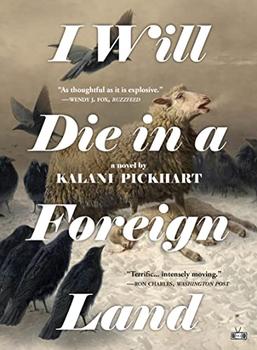Summary | Excerpt | Reading Guide | Reviews | Beyond the Book | Read-Alikes | Genres & Themes | Author Bio

This article relates to I Will Die in a Foreign Land
 Some of the main characters in Kalani Pickhart's I Will Die in a Foreign Land grew up in Chernobyl in the north of Ukraine, an area that had been home to tens of thousands of families for generations, until the explosion in reactor No. 4 at the Chernobyl Nuclear Power Plant on April 26th, 1986 sparked the worst nuclear disaster the world has ever seen. Toxic fires raged for 10 days, generating levels of radiation thought to be 500 times greater than the bomb dropped on Hiroshima.
Some of the main characters in Kalani Pickhart's I Will Die in a Foreign Land grew up in Chernobyl in the north of Ukraine, an area that had been home to tens of thousands of families for generations, until the explosion in reactor No. 4 at the Chernobyl Nuclear Power Plant on April 26th, 1986 sparked the worst nuclear disaster the world has ever seen. Toxic fires raged for 10 days, generating levels of radiation thought to be 500 times greater than the bomb dropped on Hiroshima.
In the hours following the accident, the inhabitants of 81 settlements throughout the surrounding area (totaling more than 115,000 people) were given orders to evacuate. Initial reports suggested this would be a temporary measure lasting no more than three days. As the true extent of the fallout came to light, however, a 1000-square-mile area around the Power Plant was declared an "exclusion zone," meaning it is considered too dangerous to inhabit.
In the weeks that followed, around 1,200 people — almost all of them women — illegally returned to their homes in Chernobyl. Around 200 people, still mostly women and most in their 70s and 80s, continue to inhabit the ghost towns of the exclusion zone against all the odds, having established a largely self-sufficient community.
Known as Samosely ("self-settlers"), they are often referred to affectionately as Babushkas or Babas, the respective Russian and Ukrainian words for "grandmothers." As they steadfastly refused to leave, the government eventually allowed the women to remain within the exclusion zone "semi-illegally," as long as they were beyond child-bearing age (due to the known link between radiation poisoning and severe fetal complications).
The Babushkas survive by living closely off the land — defying the widely held belief that the area is a barren wasteland. Aside from a weekly delivery of groceries from outside the exclusion zone, the women eat by keeping pigs, cattle and hens; producing honey; foraging for berries and mushrooms; and growing their own fresh produce, despite the fact that the soil is contaminated. The natural ecosystem has actually thrived in some respects since the disaster. With so few humans nearby, animals are safe from the threat of hunting and habitat loss, with the local wolf, moose, deer, owl, bear, lynx and beaver populations all thought to have grown as a result.
While the long-term impact of living among such high levels of radiation remains unclear for both the animals and the Babushkas, in the area of Belarus near the Ukrainian border, the contaminated soil has contributed to widespread illness among children, from heart and kidney problems to cataracts. Death has also stalked those who moved away. In I Will Die in a Foreign Land, Misha explains that, "It didn't just kill the people I loved, it festered inside of them. It grew, I wasn't even sure what it meant, still, when I was a kid and found out my dog was sick, my dad was sick. I thought, 'When you get sick, you get better.' But my dog didn't get better, and neither did my dad. And then years later, Vera became sick."
Despite these grim reports and the suggestion that deaths linked directly to radiation poisoning from Chernobyl will eventually total more than 4,000, the women remain unfazed. As part of a generation who have lived through oppression, famine and war under the rule of Stalin and Hitler, they consider freedom and a connection to their homeland as hard-won rights, refusing to bow to a so-called "invisible enemy" such as radiation.
"Shoot us and dig the grave, otherwise we're staying," said one of the Babushkas. Others remarked, "Those who left are worse off now. They are all dying of sadness," and, "Motherland is Motherland. I will never leave."
These words, and their speakers' continued determination to live on their own terms, is a powerful and timely reminder of the importance we place on home.
Entrance to Chernobyl exclusion zone, courtesy of Wikimedia Commons
Filed under Places, Cultures & Identities
![]() This "beyond the book article" relates to I Will Die in a Foreign Land. It originally ran in March 2022 and has been updated for the
May 2022 paperback edition.
Go to magazine.
This "beyond the book article" relates to I Will Die in a Foreign Land. It originally ran in March 2022 and has been updated for the
May 2022 paperback edition.
Go to magazine.
The less we know, the longer our explanations.
Click Here to find out who said this, as well as discovering other famous literary quotes!
Your guide toexceptional books
BookBrowse seeks out and recommends the best in contemporary fiction and nonfiction—books that not only engage and entertain but also deepen our understanding of ourselves and the world around us.